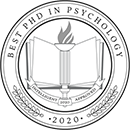
Ph.D. in Education – Educational Psychology
Your Research-Related Path to Purpose
Regent’s Doctor of Philosophy in Education – Educational Psychology allows for a broad area of academic inquiry with topics like psychological underpinnings of learning, cognitive strategies for learning in children and adults, creating environments conducive to learning, brain research, teacher education, faculty roles; and professional development in varied settings. You’ll be required to matriculate in additional research courses that will help equip you to use and develop the most appropriate and current theories and research to improve the academic and behavioral success of yourself and others. You’ll also develop habits of mind that will last a lifetime as you pursue rewarding and pivotal roles in differing settings.
INCREASE YOUR EARNING POTENTIAL
Capitalize on a higher salary with your Ph.D. degree.
EXPAND YOUR CAREER PATH
Take your career to the next level with exciting leadership opportunities.
MAKE AN IMPACT
Present ground-breaking research to improve the world of education.
ALIGN YOURSELF WITH EXCELLENCE
Regent has been ranked among top national universities by the U.S. News & World Report for two consecutive years (2019 and 2020). Our programs have also been ranked by it among the Top 5 Best Online Graduate Education Programs in Virginia for seven years in a row. Experience the Regent difference through the Ph.D. in Education – Educational Psychology program.
Presented from a Christian worldview, this specialty degree is supported by award-winning faculty in Virginia Beach.

|

|
On completing the Ph.D. in Education – Educational Psychology degree, you will be able to:
- Understand the major theories in developmental psychology using select criteria including a Christian worldview and how that affects learning.
- Provide intellectual leadership in the field of education to prepare you to produce and publish original research.
- Teach at the college level in the areas of research, learning and behavior management.
Career Opportunities
- University Faculty
- Curriculum Developer
- Educational Assessment Specialist
- Adult Education
- Advanced Educational Leadership
- Character Education
- Christian Education Leadership
- Curriculum & Instruction
- Educational Psychology
- Educational Technology & Online Learning
- Exceptional Education Executive Leadership
- Higher Education
- Higher Education Leadership & Management
- K-12 School Leadership
- Special Education
2020-2021 Semester Check-In Deadlines:
All new students are expected to check-in for the semester 2 weeks prior to the session start date. Students should apply, be accepted, enroll in their first courses, and confirm a plan to pay for their courses prior to this date.
| Session | Semester Check-In | Session Start Date |
| Session A | Friday, August 14 | Monday, August 24 |
| Session M | Friday, September 11 | Monday, September 21 |
| Session B | Friday, October 16 | Monday, October 26 |
| Session C | Tuesday, January 5 | Monday, January 11 |
| Session T | Friday, January 29 | Monday, February 8 |
| Session D | Friday, March 5 | Monday, March 15 |
| Session E | Friday, April 30 | Monday, May 10 |
| Session F | Friday, June 11 | Monday, June 21 |
Application Process – Doctoral Programs (Ph.D.)
Step 1: Application
Submit your application using our Regent University Online Application.
Note: If you are unable to complete our application due to a disability, please contact our Admissions Office and an admissions representative will provide reasonable accommodations to assist you in completing the application.
Step 2: Application Fee
Pay the $50 nonrefundable application fee by check or money order mailed to Regent University, Enrollment Support Services, 1000 Regent University Drive, Virginia Beach, VA 23464.
Fee Waiver: Attend a graduate School of Education on-campus or online information session to learn how to streamline your application process, discover financial aid resources and waive your $50 application fee.
Step 3: Graduate Program Academic Paper
Please submit a scholarly or published writing sample that demonstrates your research, writing, analytical and problem-solving skills. This writing sample may include either a copy of your master’s thesis (or a portion of it, plus biography), or a formal paper or report. Research skills mean both the skill to utilize a writing style manual (e.g., APA) and the skill of integrating published research into an academic paper or report. Email to apply@regent.edu using the subject line: SOE Doctoral Application Pieces or fax to 757.352.4725.
Step 4: Submit your Unofficial College Transcripts
We are able to examine and view your unofficial transcripts from U.S.-based schools, which indicate successful completion of bachelor’s and master’s degree programs, in order to review you for an admissions decision. Please submit your unofficial transcript to our Admissions Office by email to apply@regent.edu using the subject line: SOE Doctoral Application Pieces.
Non-U.S. transcripts must be evaluated by an NACES-approved company. For further details, please review the International Admissions Checklist on the International Students Admissions page.
International Applicants: Please visit the International Students Admissions page for a more detailed explanation of the Regent University application information and to determine whether or not you qualify as an international student.
*Upon conditional acceptance to the program by review of unofficial transcripts, Regent University’s Admissions Office will attempt to obtain your official transcripts from your U.S. degree-granting institutions, which indicate successful completion of bachelor’s and master’s degree programs. We will notify you if your previous institutions will not release transcripts directly to us.
Step 5: Complete Your Admissions Questionnaire
Please complete a brief admissions questionnaire based on your professional goals and interests. This should only take a few minutes to complete, but please answer the questions completely and thoughtfully. This gives us a better opportunity to get to know you and align your objectives with our programs. The admissions questionnaire can be found here. Once completed, it will be sent directly to an admissions counselor who will be in touch with you right away to help complete the rest of your application.
Step 6: Government-Issued ID
To ensure academic integrity, Regent University requires a copy of a government-issued ID. Please email a scanned copy or photograph of it to apply@regent.edu with the subject line: Government ID.
Step 7: Admissions Interview
If an interview is necessary, the admissions office will contact you to schedule an appointment. The interview can be conducted on campus or over the phone and typically takes about an hour.
Note: All items submitted as part of the application process become the property of Regent University and cannot be returned.
2019-20 Tuition Rates
| Degree Level / Program | Cost Per Credit Hour |
|---|---|
Ed.S., Ed.D., & Ph.D. | $775 per credit (In-state & Out-of-state) |
Student Fees Per Semester
| University Services Fee (Online Students) | $550 |
| Library Orientation | $50 (one-time fee) |
| Blackboard Orientation | $50 (one-time fee) |
2020-21 Tuition Rates
| Degree Level / Program | Cost Per Credit Hour |
|---|---|
Ed.S., Ed.D., & Ph.D. | $775 per credit (In-state & Out-of-state) |
Student Fees Per Semester
| University Services Fee (Online Students) | $600 |
| Library Orientation | $50 (one-time fee) |
| Blackboard Orientation | $50 (one-time fee) |
*Rates are subject to change at any time.
Estimated Cost of Attendance: View the estimated cost of attendance to see an example of the total cost of tuition and fees.
Ph.D. Requirements
A Ph.D. student will (a) complete 21 hours associated with the Ed.D. core curriculum, (b) complete 24-26 hours associated with an Ed.D. concentration, (c) complete an additional 9 hours of research related credit, and (d) complete 15 hours of dissertation research credit—the total program is 75-77 hours. The candidacy examination will be administered during the final semester of coursework. A candidate for the Ph.D. degree must present an acceptable research-based dissertation. The dissertation demonstrates that the candidate has technical competence in the field and has done research of an independent character. It must add to or modify what was previously known in the candidate’s field of interest, or present a significant interpretation of the subject based upon original investigation and research.
Research Related Credit:
Ph.D. students are required to take the following courses:
EDCO 801 Strategic Planning & Program Evaluation (3 credits)
EDCO 802 Analysis of Variance (1 credit)
EDCO 803 Regression & Correlation (1 credit)
EDCO 804 Structure & Reliability Analysis (1 credit)
EHEA 805 Advanced Research Design and Analysis (3 credits)
Faculty
Dr. Carr is the concentration chair for Educational Psychology and is committed to your success.
Dr. Paul Carr joined Regent University as an assistant professor of higher education administration in the School of Education in July 2000. He came from The George Washington University where he was director of the Higher Education Administration Master’s and Education Specialist programs. Dr. Carr held several positions with The George Washington University including: director of special projects, director of off-campus technology, and research assistant for Dr. Gary Confessore and Dr. Reynolds Ferrante. Additionally, he taught master’s and doctoral level courses in the Educational Technology Leadership Program, Educational Leadership Program, Human Resource Development Program and Engineering Management Program.
Carr is a member of Sigma Tau Delta and a founding fellow of Beta Phi (GWU Chapter). A native of Norfolk, Virginia, Carr attended Virginia Wesleyan College and earned a B.A. in English with minors in art and religious studies. He then earned an M.A. in Education and Human Development with a concentration in Human Resource Development and a Doctor of Education degree in Higher Education Administration at The George Washington University. His research interests include autonomous learning, human resource development, and organizational leadership.

